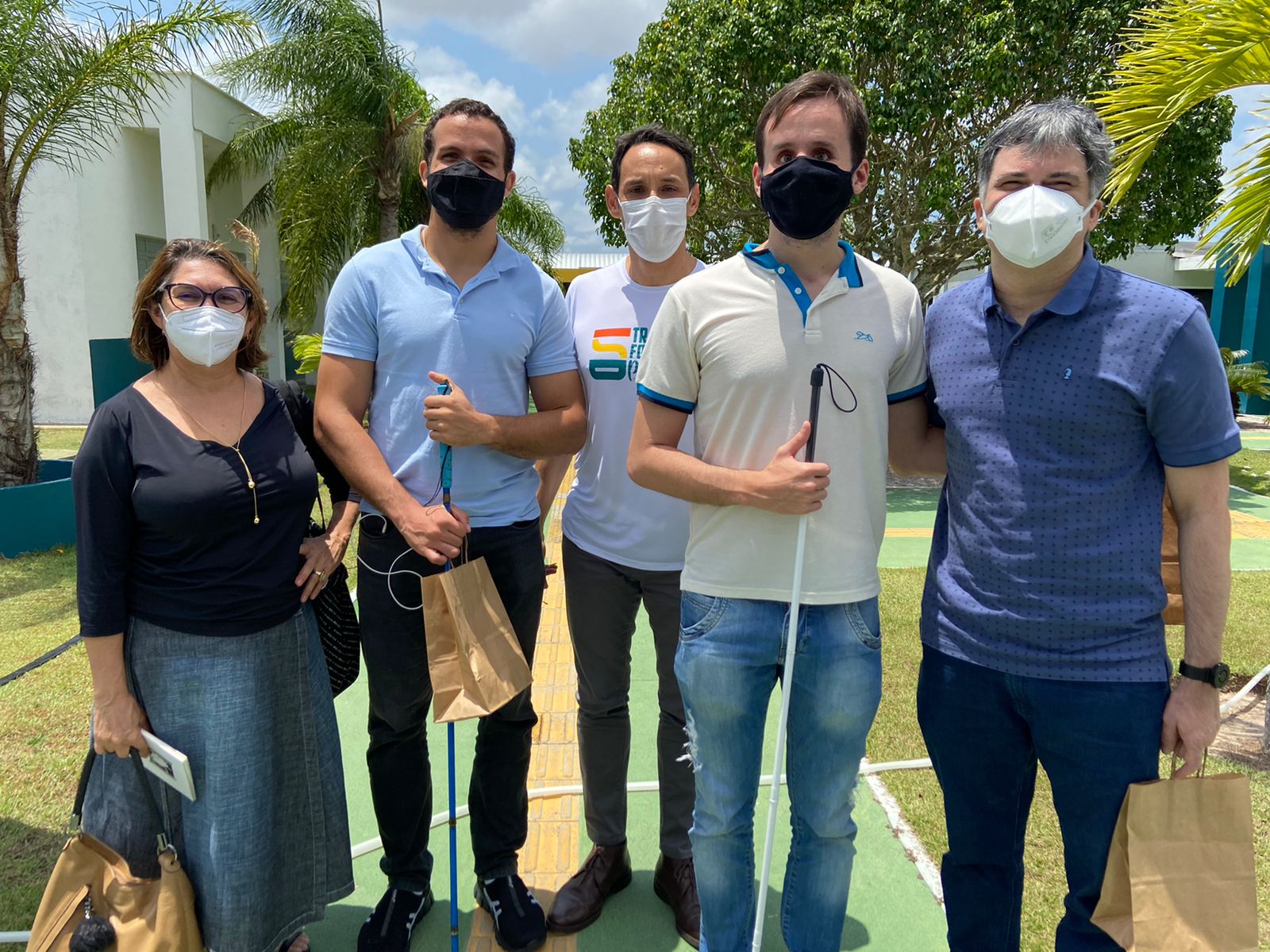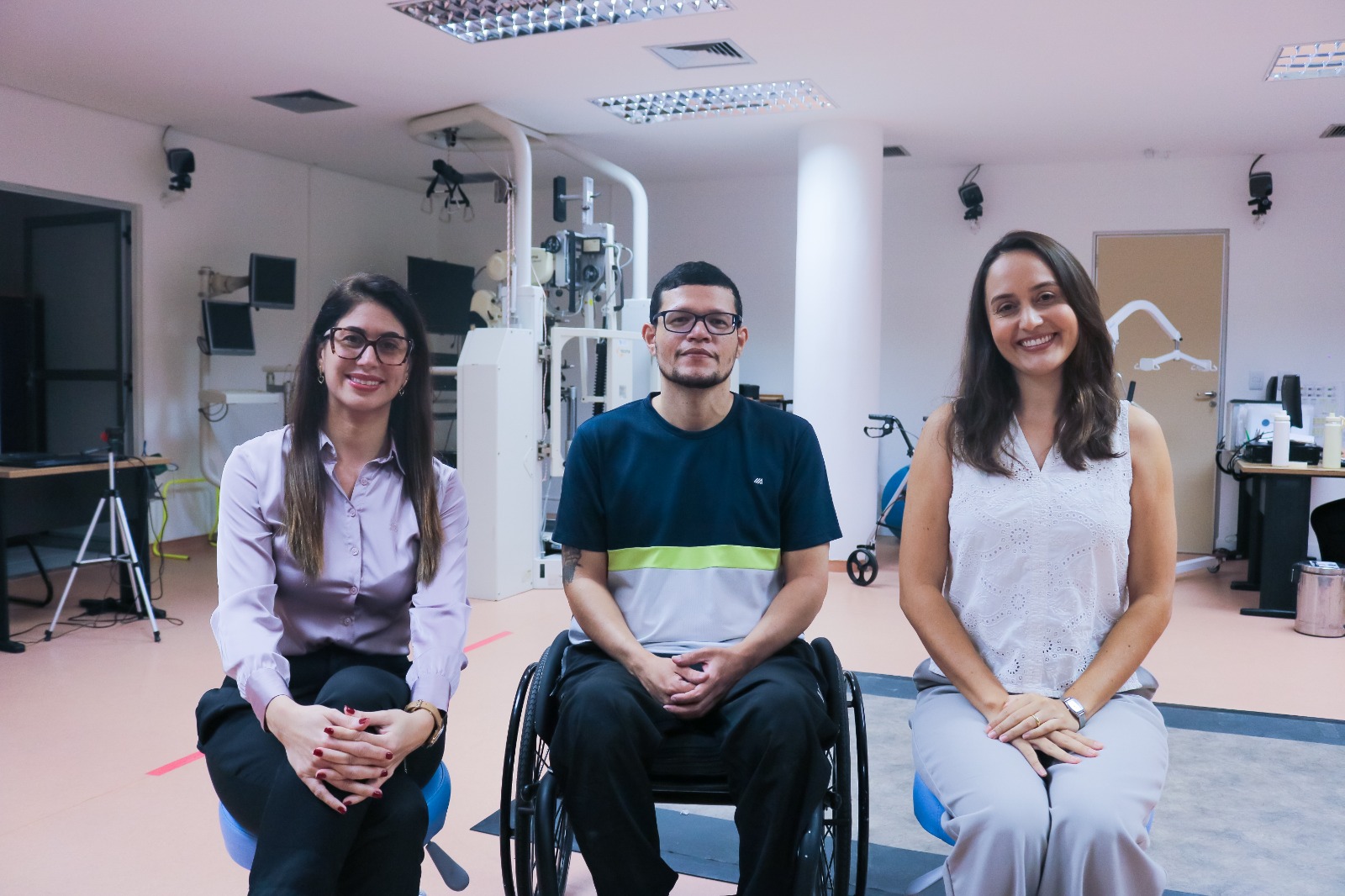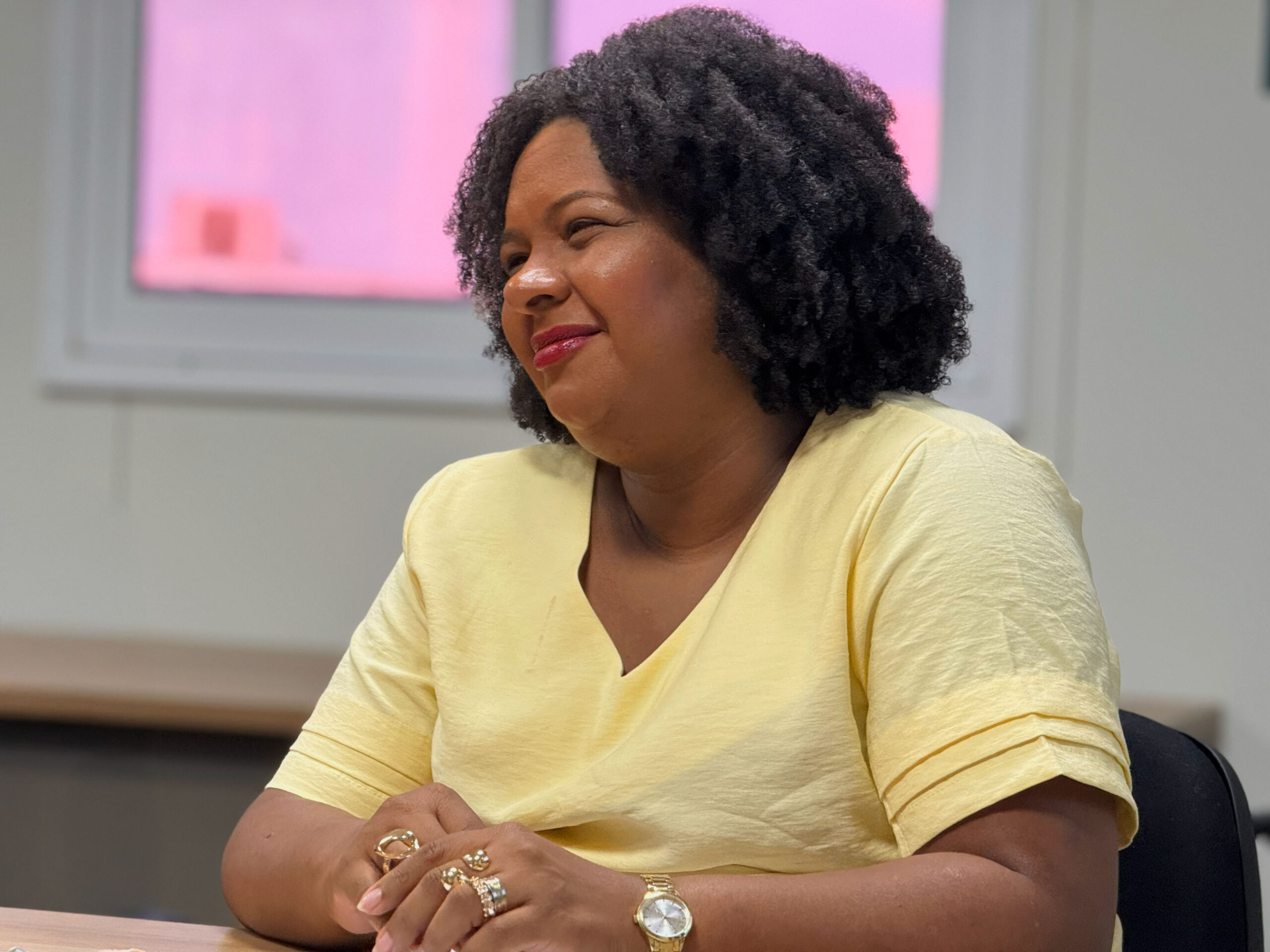The Santos Dumont Institute (ISD), which was recently enabled to serve users with some type of visual impairment through the Specialized Rehabilitation Center IV (CER IV ISD), in Macaíba, welcomed Prof. Dr. Érico Gurgel Amorim, journalist Fernando Campos and Paralympic judoka Arthur Cavalcante da Silva from Rio Grande do Norte. They are blind and were invited by the Institute's general director, Reginaldo Freitas Jr., to serve as members of an Advisory Committee for the ISD regarding demands related to blind people.
In addition, Professor Luzia Guacira dos Santos Silva, from the Department of Education at the Federal University of Rio Grande do Norte (UFRN), discussed the limitations of autonomy, architectural barriers and the lack of collective knowledge in society about the inclusion of blind people. Defining which are the priority services, seeking innovation for assistive technologies and becoming a reference in Rio Grande do Norte are objectives of CER IV ISD, which is expected to start operating in the first months of 2022.
Throughout this week, ISD CEO Reginaldo Freitas Jr., accompanied by Lilian Lira Lisboa, general manager of the Anita Garibaldi Center for Education and Health Research (Anita), and CER IV ISD coordinator Hougelle Simplício, will visit centers specializing in the habilitation and rehabilitation of people with some type of visual impairment, such as the Dorina Nowill Foundation for the Blind in São Paulo (SP) and the Instituto de Cegos Elementary School in Fortaleza (CE). The goal is to evaluate the care models adopted in these locations, talking to the medical professionals and professionals from various specialties who work there.
“We cannot make CER IV ISD work without being focused and aligned with the demands of our users. We must be inspired by people with visual impairments, understanding that they are the true protagonists of the implementation of these new services. Nothing about them without them. We need a permanent channel for open and frank conversation about inclusive attitudes in the daily lives of blind people, so that, for example, we do not use ableist terms and assume ableist behaviors. Health education, professional training and health care for people with visual impairments must work together to mediate this, and ISD can play this educational role in Rio Grande do Norte,” highlighted Reginaldo Freitas Jr, ISD’s general director.
After a brief presentation of the projects and services developed by the Institute, the guests began to present their demands and ideas as users of the service network for blind people.
Professor Luzia Guacira dos Santos Silva stated that special education needs to be centered on the perspective of educational and social inclusion. “The condition of human disability should be seen as a social issue. The social environment is what causes the lack of inclusion of people with disabilities in society as a whole. There is also family resistance and the lack of public policies. The issue of education is crucial. We see very clearly in the speeches of those present the three pillars: autonomy, independence and safety of people with visual impairment. Nothing we do for them should be distant from them. I am very happy that ISD has taken a listening position. They are starting from this listening and thinking about actions and it is essential to include the family nucleus in these discussions”, stressed the pedagogue who has published books on Inclusive Education.
She listed that many blind people in Rio Grande do Norte do not have access to the Braille Writing System because they cannot afford, for example, a low-cost piece of equipment called a reglete – an instrument that allows blind people to write and read Braille. In addition, the lack of policies for training teachers in the public education system to meet the demands of blind students is a factor that hinders the inclusion of this community in regular schools. In Rio Grande do Norte, for example, there is no quantitative data on people with visual impairments. “We need to map out where and who the people with visual impairments are in RN. In terms of training professionals, everything is very precarious”, highlighted Luzia Guacira dos Santos Silva.
Demands
Journalist Fernando Campos, who became blind after suffering from cancer, celebrated the ISD’s attitude in bringing together blind people with different profiles and needs to hear from them what types of services need to be offered by CER IV so that patients become minimally dependent on non-blind people in carrying out daily activities. “The ideal would be for all companies and institutions to listen to people with disabilities. I want to start by congratulating the ISD for this first step, which is listening to those who live this reality of visual impairment,” said the young digital influencer. He also mentioned how the use of technology has positively revolutionized his life. “I do almost everything with my cell phone. Including these people in technology is very important these days.” He then raised a relevant point. “The more humble people with disabilities are, the less information they will have. To combat prejudice and preconceived ideas, the weapon is information. We need to raise awareness among the families of these individuals,” he stated.
Endocrinologist and professor at the Multicampi School of Medical Sciences (EMCM/UFRN), Érico Gurgel Amorim, had almost complete vision until he was 30 years old. Today, a little over a decade later, he has 2% of vision due to retinitis pigmentosa. For him, the most difficult aspect of blindness is the lack of knowledge among the sighted population. “Ableism is all around us and we don’t realize it. A diagnosis of blindness should not be seen as a death sentence, neither by the patient nor by their family members. We need to think about the subject from the psychological and emotional perspectives, promoting autonomy through technology to open up possibilities in the fields of education and mobility. We should not close ourselves off in the issue of victimization,” declared the university professor.
Paralympic athlete Arthur Cavalcante da Silva, who recently competed for medals in Judo at the Tokyo Paralympics, stressed that motivation should serve as fuel for any person with a disability, and that each person should try to go further. “We need to bring values and references to the blind. They can do much more than we imagine, much more than society thinks. Technology helps the development of people with disabilities and they can contribute a lot to society. Achieving something, motivation, goes beyond genius. Society puts us in a comfortable situation, of doing nothing, of thinking that everything is dangerous. Most blind people receive disability pensions and the State recognizes the blind as incapable. This needs to change”, he argued.
He also mentioned that blind people in less privileged social classes lack educational opportunities, as well as orientation and mobility courses. For him, blind people are capable of performing numerous activities. “I wanted to be an athlete, attend college and contribute to society. Sports are an important tool.”
Based on these reports, the multidisciplinary technical team at the Santos Dumont Institute will define the services to be offered at CER IV ISD, as well as the dynamics of activities to support school inclusion; the provision of ocular prostheses; training in autonomy for life activities; specific rehabilitation, such as eye therapy; and the development of sports practices for this population. Over the next few days, centers specialized in serving people with visual impairments, such as the Dorina Nowill Foundation and the Colégio Vicentino de Cegos Padre Chico, in São Paulo, will be visited by the ISD team to exchange knowledge and experiences about serving this population.
In addition to the names already mentioned, the meeting was attended by the administrative director of ISD, Jovan Gadioli; the general manager of the Edmond and Lily Safra International Institute of Neuroscience (IIN-ELS), Edgard Morya; the multidisciplinary physiotherapist preceptors, Camila Simão and Lorenna Santiago; and the coordinator of CER IV ISD, neurosurgeon Hougelle Simplício.
CER IV
The Ministry of Health published, in the Official Gazette of the Union on August 6, 2021, Ordinance No. 1,842, signed by Minister Marcelo Queiroga, which formalizes the change of category of the Anita Garibaldi Specialized Rehabilitation Center (CER ISD) located in the area rural Macaíba, from III to IV. From now on, in addition to rehabilitation services for hearing, intellectual and physical disabilities, CER IV operated by the Santos Dumont Institute (ISD) will now serve users with visual impairments.
The first CER IV in Greater Natal, and the second in Rio Grande do Norte, will serve users from the 7th Health Region, which includes the municipalities of Macaíba, Natal, Parnamirim, Extremoz and São Gonçalo do Amarante. This region has 1,371,945 inhabitants, which corresponds to almost 39% of the population of Rio Grande do Norte. To finance the procedures, the Ministry of Health will make an annual contribution of R$ 1,740,000.00.
Text: Ricardo Araújo / Ascom – ISD
Images: Ricardo Araújo / Ascom – ISD
Communication Office
comunicacao@isd.org.br
(84) 99416-1880
Santos Dumont Institute (ISD)
It is a Social Organization linked to the Ministry of Education (MEC) and includes the Edmond and Lily Safra International Institute of Neurosciences and the Anita Garibaldi Health Education and Research Center, both in Macaíba. ISD's mission is to promote education for life, forming citizens through integrated teaching, research and extension actions, in addition to contributing to a fairer and more humane transformation of Brazilian social reality.













